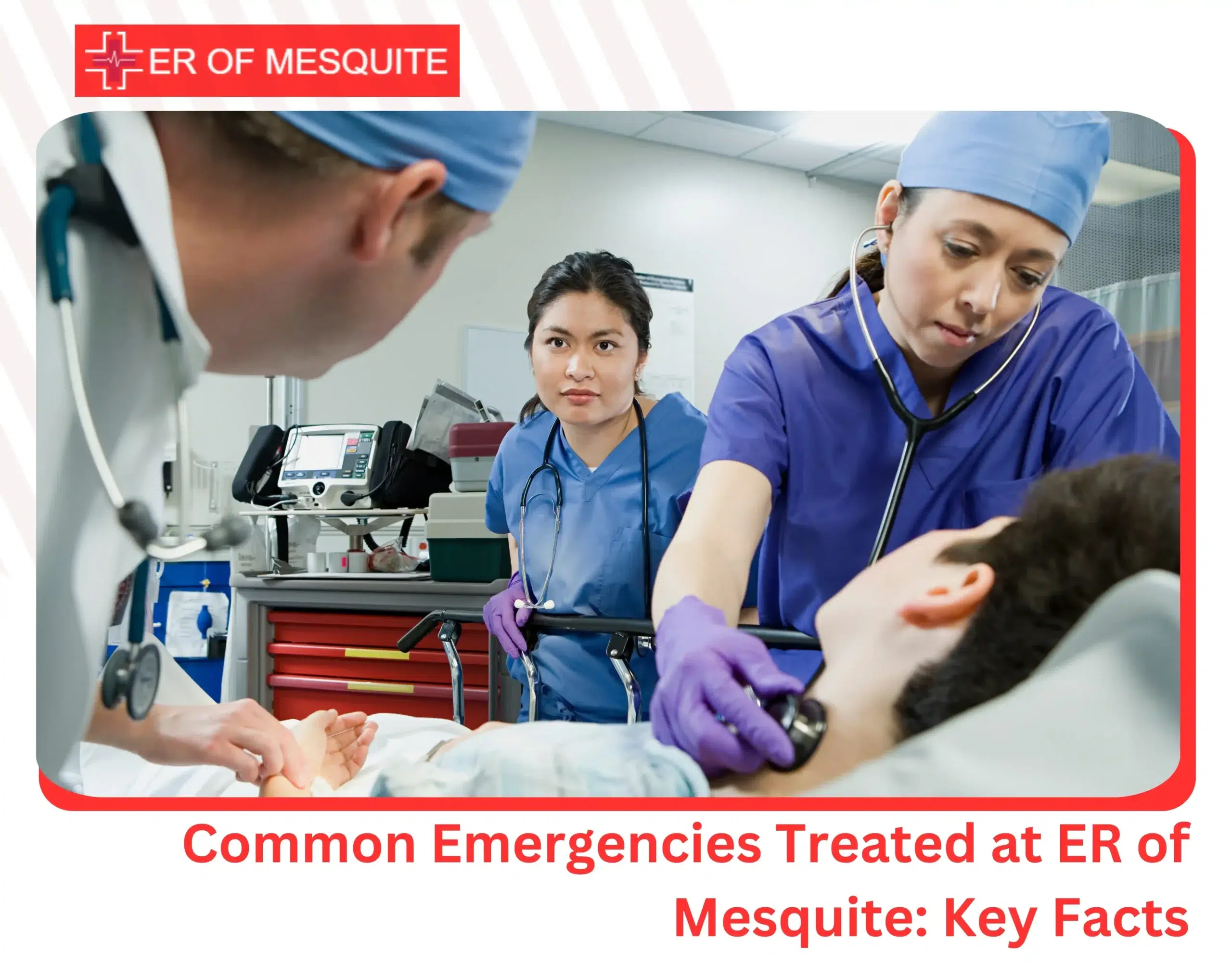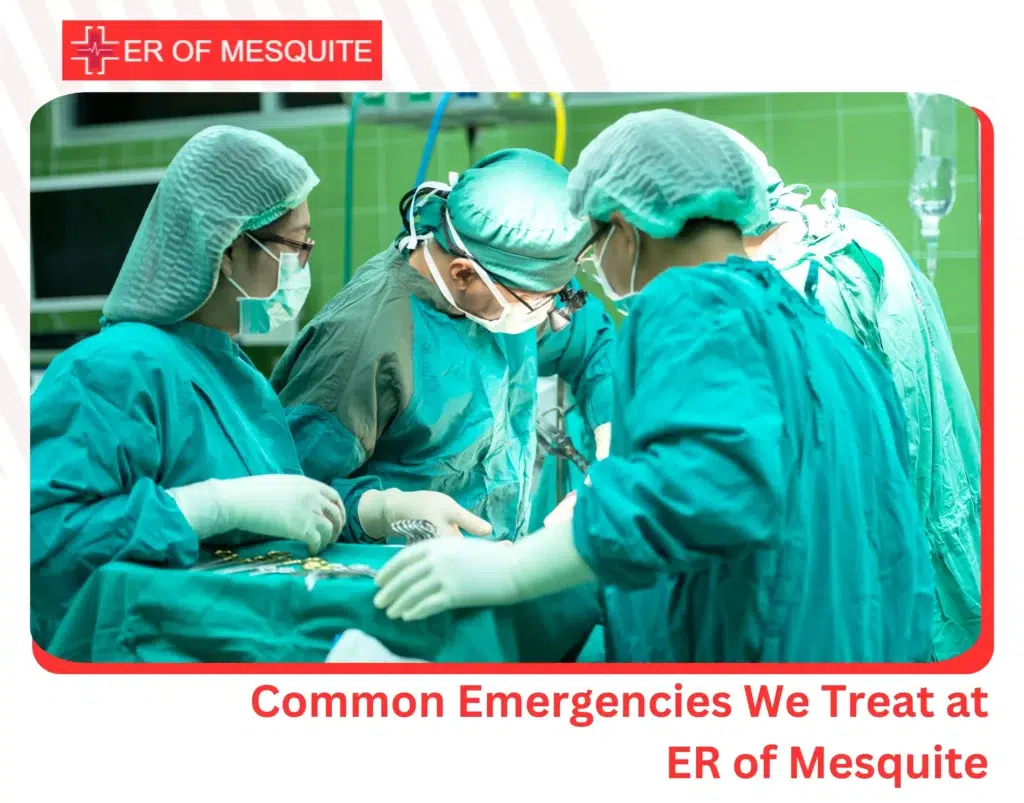Every day at Mesquite ER, we deal with emergencies involving chest pain, high fever, or injuries that seem to get worse by the minute. In moments like these, where you go matters just as much as how quickly you get there.
At ER of Mesquite, we understand that emergencies don’t wait for convenience. Our team is here around the clock, ready to handle everything from critical injuries to sudden illnesses that strike when clinics are closed. But how do you know when it’s time to visit the ER? And what to expect when you walk through our doors?
Below, we’ll walk you through the most Common Emergencies Treated at ER of Mesquite, helping you spot warning signs that demand immediate attention.
Common Emergencies We Treat
Chest Pain and Cardiac Emergencies
Chest pain can vanish as quickly as it starts—or spiral into something far worse. While not all chest pain indicates a heart attack, it’s essential to rule out serious conditions such as:
- Heart attack: Chest pain that spreads to your jaw or arm, shortness of breath, or nausea can be signs of a heart attack
- Angina: This occurs when there is reduced blood flow to the heart, leading to chest tightness.
- Pulmonary embolism: Life-threatening blood clots in the lungs
Our emergency team will start with electrocardiograms (ECGs) to check your heart rhythm, perform blood tests, and use advanced imaging like CT scans to pinpoint the issue.
Read More: Common Heart Tests and When You Need Them
Stroke Symptoms and Neurological Emergencies
A stroke happens when the blood supply to the brain is disrupted, usually because of a clot or a ruptured blood vessel. Some common stroke warning signs to look out for include:
- Sudden weakness or numbness, especially on one side of the body.
- Trouble speaking or understanding what others are saying.
- A severe headache with no apparent reason.
The emergency room team applies the FAST protocol (Face, Arms, Speech, Time) for rapid stroke assessment, enabling timely treatment to restore blood flow.
Traumatic Injuries
Injuries from accidents are one of the top reasons people visit the emergency room. Common types of injuries include:
- Broken bones and fractures: These are diagnosed using X-rays and typically treated with splints or casts.
- Head injuries: Signs such as confusion or loss of consciousness could suggest a concussion or other brain injury.
- Lacerations and cuts: These are cleaned and may be stitched or stapled to prevent infection and aid in healing.
The emergency room in Mesquite offers comprehensive care for injuries, utilizing advanced imaging technology and surgical procedures when necessary.
Respiratory Distress
Breathing difficulties can be concerning and may arise from various conditions, including:
- Asthma attacks: Often triggered by allergens or respiratory infections.
- COPD exacerbations: Chronic obstructive pulmonary disease can worsen due to irritants or illness.
- Severe allergies (anaphylaxis): Necessitating immediate treatment with epinephrine and oxygen.
The ER treats respiratory distress with tailored interventions, including nebulizers for airway relief, steroids to reduce inflammation, and oxygen therapy to restore normal breathing.
Abdominal Pain
Abdominal pain is a frequent and intricate issue, varying from slight discomfort to serious emergencies. Some potential causes include:
- Appendicitis: A sudden pain in the lower right abdomen that often necessitates surgery.
- Gallstones: A sharp pain in the upper right abdomen caused by blockages in the bile duct.
- Kidney stones: Severe, cramping pain that can radiate to the back or groin.
At the ER of Mesquite, we utilize ultrasound, CT scans, and blood tests to swiftly pinpoint the cause of abdominal pain and decide on the best treatment approach.
Severe Allergic Reactions
Anaphylaxis is a severe allergic reaction that demands prompt medical attention. Symptoms can include:
- Swelling of the face, lips, or throat
- Trouble breathing or swallowing
- A rapid decrease in blood pressure
The emergency room team at Mesquite is equipped to administer epinephrine and other treatments to quickly counteract these critical reactions.
Infections and Fever
High fever, severe infections, and sepsis are critical conditions that are addressed in the ER. Some common examples include:
- Urinary tract infections (UTIs): Particularly when they come with fever or back pain, which may suggest kidney involvement.
- Pneumonia: Marked by fever, cough, and trouble breathing.
- Sepsis: A serious reaction to infection that demands immediate antibiotic treatment.
Diagnostic tools and focused therapies guarantee that patients get the necessary care without delay.
Seizures and Neurological Events
Seizures can occur due to epilepsy, head injuries, or sometimes for reasons that are not clear. Important symptoms to watch for include:
- Loss of consciousness
- Uncontrolled movements
- Confusion or disorientation after the event
The ER provides comprehensive care for seizures, utilizing medications and monitoring to stabilize patients and prevent complications.
Pediatric Emergencies
Children frequently need specialized medical attention for issues such as:
- High fevers and febrile seizures
- Respiratory infections, including croup or RSV
- Minor injuries like cuts, sprains, and fractures
Severe Headaches and Migraines
While many headaches or migraines can be treated at home, it’s important to seek emergency care for sudden or severe headaches, especially if they come with:
- Changes in vision or loss of sight.
- Numbness or weakness in any part of the body.
- Stiffness in the neck or fever, which could suggest meningitis.
The emergency room staff will perform imaging and blood tests to determine the cause and help alleviate your symptoms.
Get Emergency Care You Can Trust
Don’t second-guess emergencies that need immediate attention. From severe chest pain to critical injuries, getting the right care quickly can change everything. At ER of Mesquite, we offer advanced lab testing, rapid imaging, and experienced emergency physicians available 24/7. Our minimal wait times mean you get the care you need right when you need it.
FAQs
What is the most common complaint in the emergency department?
Abdominal pain is the most frequent complaint we see at ER of Mesquite, ranging from mild discomfort to severe pain that needs immediate attention. Our emergency team uses advanced diagnostics, including lab work and imaging, to quickly identify the cause.
What is the most common ER injury?
The most common ER injury is fractures from falls and accidents. Our ER provides immediate X-rays, skilled physicians, and advanced treatment options to handle everything from simple breaks to complex fractures.
What is the most critical information on an emergency call?
During an emergency call, provide three essential details: your exact location (including nearby landmarks), the nature of your emergency (specific symptoms or injuries), and any immediate dangers to you or others. This helps our team prepare the right resources before you arrive.


